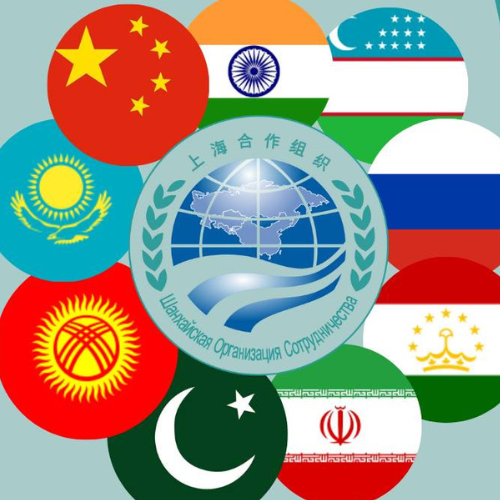A China-led regional organization called the Shanghai Cooperation Organization (SCO) is speaking out against protectionist trade measures and sanctions. The group, made up of 10 member countries, including China, Russia, Iran, India, and Pakistan, recently held a meeting in Islamabad, Pakistan. During this meeting, leaders voiced their concerns over trade barriers and sanctions imposed by Western countries, particularly the United States, Canada, and the European Union.
The Shanghai Cooperation Organization is not just a trade group; it’s also a political and security alliance, which makes this joint statement even more significant. They are particularly concerned about protectionist measures, which are policies that limit free trade by making it harder or more expensive to buy and sell goods from certain countries. In their statement, the leaders of the Shanghai Cooperation Organization highlighted that these measures are against the rules set by the World Trade Organization (WTO), a global organization that works to promote free trade between countries.
The United States and Canada have recently increased taxes (or tariffs) on Chinese products such as electric cars, aluminum, and steel. The European Union (EU) is expected to follow with similar policies. These actions have caused tension between the West and China, with each side accusing the other of unfair trade practices. China has also taken steps to retaliate by imposing tariffs of its own. The standoff is growing more intense, as both sides continue to take actions that harm trade relations.
Criticism of Unilateral Sanctions
In addition to criticizing protectionist trade measures, the Shanghai Cooperation Organization also expressed strong opposition to the use of unilateral sanctions. These are punishments placed on one country by another, often in the form of trade restrictions, to pressure them into changing certain behaviors. The group argues that such sanctions are illegal under international law and have negative effects on countries that are not even involved in the conflict.
Two of the group’s members, Russia and Iran, have been hit hard by sanctions from Western countries. Russia has been facing sanctions ever since it became involved in the conflict in Ukraine, while Iran has been under economic sanctions primarily due to its nuclear activities. Both countries are major energy producers with vast reserves of oil and natural gas, but sanctions have made it harder for them to sell their resources.
Smaller countries are especially hesitant to do business with Russia and Iran because they fear facing consequences from the United States or the European Union. This has led to a complicated situation where countries like China and India, which are powerful and have more influence on the global stage, continue to buy energy from these sanctioned countries, while smaller nations avoid such trade.
China’s Heavy-Handed Sanctions Against Taiwan’s Robert Tsao and Puma Shen Spark Tensions
One example of the impact of these sanctions can be seen with Pakistan. Despite being neighbors, Pakistan does not import gas or fuel from Iran, even though it would be cheaper. A major gas pipeline project between the two countries has been delayed for years because Pakistan fears facing U.S. sanctions if it goes ahead with the deal. This shows how even countries not directly involved in a conflict are affected by these trade restrictions.
Calls to Expand China’s Belt and Road Initiative
During the meeting, Pakistan’s Prime Minister Shehbaz Sharif made a strong push for expanding China’s Belt and Road Initiative (BRI). The BRI is one of China’s largest global projects, aimed at building infrastructure like roads, railways, and digital networks to connect Asia with Europe and Africa. The project, launched about ten years ago, is worth around $1 trillion, and over 150 countries have signed up to participate in it. Russia is one of the major countries involved in the BRI.
For Pakistan, the BRI is especially important because it includes the China-Pakistan Economic Corridor (CPEC). This is a key part of the BRI and involves billions of dollars in investments by China to build highways, ports, and even airports in Pakistan. The aim is to create better trade routes and strengthen ties between the two nations. Prime Minister Sharif emphasized how expanding the BRI would benefit not only Pakistan but the entire region by increasing cooperation and integration.
China’s rivals, particularly in the West, see the BRI as more than just a series of construction projects. They view it as a way for China to extend its influence around the world. To counter this, Western countries under the Group of Seven (G7) launched their own infrastructure development plan worth $600 billion in 2023. This plan is meant to provide an alternative to the BRI and ensure that countries are not solely dependent on China for their infrastructure needs.
The rising tensions between the East and the West over trade, tariffs, and sanctions are likely to continue influencing global politics and economics. Countries like China and its allies in the Shanghai Cooperation Organization argue that protectionist measures and unilateral sanctions are hurting free trade and harming third countries that get caught in the middle. The growing divide between the Shanghai Cooperation Organization’s vision of global cooperation and the West’s push for protectionism and sanctions shows how complicated international relations have become.
For now, the Shanghai Cooperation Organization is standing firm in its belief that free trade and the removal of sanctions are essential for the global economy to thrive. At the same time, the group’s push to expand China’s Belt and Road Initiative signals that China’s role in global infrastructure and economic development is only going to increase, creating new challenges for its Western rivals.


